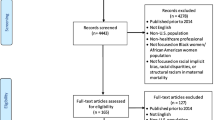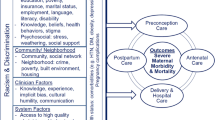Abstract
Objectives: The general objective of this study is to explain differentials in prenatal care (PNC) utilization in a nationally representative sample of non-Hispanic White (Anglo), African American, and Mexican American women. Method: The analysis is based on the National Maternal and Infant Health Survey. Multivariate, multinomial logistic regression models were employed to adjust for demographic, socioeconomic, medical risk, and program participation factors, as well as for perceived barriers. Both race/ethnic-specific models and models with race/ethnicity as a covariate were estimated. Results: Inadequate PNC use was much less common among Anglos (10.4%) as compared to African Americans and Mexican Americans (22.1% and 25.0%, respectively). In fully adjusted models, the odds ratio (OR) of African Americans receiving inadequate PNC was 1.46, while the risk for Mexican Americans was greater (OR = 1.93). Perception of obstacles to PNC access doubled the odds of receiving inadequate care, but this psychosocial variable had little impact on race/ethnic differentials. Race/ethnic-specific models uncovered potentially important racial/ethnic variations associated with perception of barriers, marital status, and program participation. Conclusions: Although the same risk factors sometimes have different effects across race/ethnic groups, and while certain findings indicate a beneficial impact of health outreach efforts and program participation, our findings support the conclusion that PNC utilization continues to be stratified along race/ethnic lines.
Similar content being viewed by others
REFERENCES
Committee to Study the Prevention of Low Birthweight. Preventing low birthweight. Washington, DC: National Academy Press, 1985.
Institute of Medicine. Prenatal care: Reaching mothers, reaching infants. Washington, DC: National Academy Press, 1988.
Alexander GR, Korenbrot CC. The role of prenatal care in preventing low birth weight. In: Behrman RE, editor. The Future of Children 1995;5:103–20.
Clarke LL, Albrecht SL, Miller MK. Maternal medical problems, prenatal care “adequacy” and low birthweight among high risk women. Unpublished Manuscript, 1998.
Clarke LL, Miller MK, Albrecht SL, Frentzen B, Cruz A. The role of medical problems and behavioral risks in explaining patterns of prenatal care among high-risk women. Health Serv Res 1999;34:145–57.
Fiscella K. Does prenatal care improve birth outcomes? A critical review. Obste Gynecol 1995;85:468–79.
Kotelchuck M. Adequacy of prenatal care utilization: Reply to Delgado-Rodriguez et al. Epidemiology 1997;8:648–50.
U.S. Department Of Health and Human Services. HealthyPeople 2010: National health promotion and disease prevention objectives.Washington, DC: U.S. Government Printing Office, 2000.
Yu SM. Healthy People 2010. Matern Child Health J 1998;2:63–6.
Shiono PH, Behrman RE. Low birth weight: Analysis and recommendations. The Future of Children 1995;5:4–18.
Alexander GR, Kogan MD, Himes, JH. 1994-1996 U.S. singleton birth weight percentiles for gestational age by race, Hispanic origin, and gender. Matern Child Health J 1999;3:225–32.
Ingram DD, Makuc D, Kleinman JC. National and state trends in prenatal care, 1970-1983. Am J Public Health 1986;76:415–23.
Singh S, Torres A, Forrest JD. The need for prenatal care in the United States: Evidence from the 1980 National Natality Survey. Fam Plann Perspect 1985;17:118–24.
Tossounian SA, Schoendorf KC, Kiely JL. Racial differences in perceived barriers to prenatal care. Matern Child Health J 1997;1:229–36.
Ventura SJ, Martin JA, Curtin SC, Matthews TJ, Park MM. Births: Final data for 1998. Natl Vital Stat Reps 2000;48(3):1–100.
Goldenberg RL, Patterson ET, Freese MP. Maternal demographic, situational and psychosocial factors and their relationship to enrollment in prenatal care: A review of the literature. Women Health 1992;19:133–51.
Bean FD, Tienda M. The Hispanic population of the United States. New York: Russell Sage Foundation, 1987.
Sable MR, Stockbauer JW, Schramm WF, Land GL. Differentiating the barriers to adequate prenatal care in Missouri, 1987-1988. Public Health Reps 1990;105:535–43.
Meikle SF, Orleans M, Leff M, Shain R, Gibbs RS. Women's reasons for not seeking prenatal care: Racial and ethnic factors. Birth 1995;22:81–6.
Kalofonos I, Palinkas LA. Barriers to prenatal care for Mexican and Mexican American women. J Gender, Cult, Health 1999;4:135–52.
York R, Grant C, Tulman L, Rothman RH, Chalk L, Perlman D. The impact of personal problems on accessing prenatal care in low-income urban African American women. J Perinatol 1999;19:53–60.
Frisbie WP, Biegler M, deTurk P, Forbes D, Pullum SG. Determinants of intrauterine growth retardation and other compromised birth outcomes: A comparison of Mexican Americans, African Americans, and Non-Hispanic Whites. Am J Public Health 1997;87:1977–83.
LeClere FB, Jensen L, Biddlecom AE. Health care utilization, family context, and adaptation among immigrants to the United States. J Health Soc Behav 1994;35:370–84.
Thamer M, Richard C, Casebeer AW, Ray NF. Health insurance coverage among foreign-born US residents: The impact of race, ethnicity, and length of residence. Am J Public Health 1997;87:96–103.
Albrecht SL, Miller MK. Hispanic subgroup differences in prenatal care. Soc Biol 1996;43:38–58.
Council on Scientific Affairs. Hispanic health in the United States, a council report. J Am Med Assoc 1991;265:248–52.
Frisbie WP, Forbes D, Hummer RA. Hispanic pregnancy outcomes: Additional evidence. Soc Sci Q 1998;79:149–70.
Hummer RA, Biegler M, deTurk P, Forbes D, Frisbie WP, Hong Y, Pullum SG. Race/ethnicity, nativity and infant mortality in the United States. Soc Forces 1999;77:1083–118.
Currie J. The effect of welfare on child outcomes. In: Moffitt RA, editor.Welfare, the family, and reproductive behavior: Research perspectives.Washington, DC: National Academy Press, 1998.
David R. Race, birth weight, and mortality rates. J Pediatr 1990;116:101–02.
National Center for Health Statistics. Public use data tape documentation. 1988 National Maternal and Infant Health Survey. Hyattsville, MD: National Center for Health Statistics, 1991.
Sanderson M, Placek PJ, Kepel KG. The 1988 National Maternal and Infant Health Survey: Design, content, and data availability. Birth 1991;18:26–32.
Moss N, Carver K. The effect of WIC and Medicaid on infant mortality in the United States. Am J Public Health 1998;88:1354–61.
Shah BV, Barnwell BG, Hunt PN, LaVange LM. Survey Data Analysis (SUDAAN) User's Manual Release 7.5. Research Triangle Park, NC: Research Triangle Institute, 1997.
Kessner D, Singer J, Kalk CE, Schlesinger ER. Infant death: An analysis by maternal risk and health care. Washington, DC: Institute of Medicine and National Academy of Sciences, 1973; chap. 2.
Kotelchuck M. Evaluation of the Kessner adequacy of prenatal care index and a proposed adequacy of prenatal care utilization index. Am J Public Health 1994;84:1414–20.
Kotelchuck M. The adequacy of prenatal care utilization index: US distribution and association with low birthweight. Am J Public Health 1994;84:1486–89.
Kogan MD, Martin JA, Alexander GR, Kotelchuck M, Ventura SJ, Frigoletto FD. The changing pattern of prenatal care utilization in the United States, 1981-1995, using different prenatal care indices. J Am Med Assoc 1998;279:1623–28.
Rogers R. Ethnic differences in infant mortality: Fact or artifact? Soc Sci Q 1989;70:642–9.
Kleinman JE, Kessel SS. Racial differences in low birth weight: Trends and risk factors. New Engl J Med 1987;317:749–53.
Molina CW, Aguirre-Molina M (editors). Latino health in the US: A growing challenge. Washington, DC: American Public Health Association, 1994.
Cobas JA, Balcazar H, Benin MS, Keith VM, Chong Y. Acculturation and low-birthweight infants among Latino women: A reanalysis of HHANES data with structural equation models. Am J Public Health 1996;86:394–6.
Scribner R. Paradox as paradigm–The health outcomes of Mexican Americans. Am J Public Health 1996;86:303–04.
Williams RL, Binkin NJ, Clingman EJ. Pregnancy outcomes among Spanish-surname women in California. Am J Public Health 1986;76:387–91.
Vega WA. Hispanic families in the 1980s:Adecade of research. J Marr Fam 1990;52:1015–24.
Massey DS, Denton NA. Trends in the residential segregation of Blacks, Hispanics, and Asians: 1970-1980. Am Soci Rev 1987;52:802–25.
Massey DS, Eggers ML. The ecology of inequality: Minorities and the concentration of poverty, 1970-1980. Am J Sociol 1990;95:1153–88.
Author information
Authors and Affiliations
Corresponding author
Rights and permissions
About this article
Cite this article
Frisbie, W.P., Echevarria, S. & Hummer, R.A. Prenatal Care Utilization Among Non-Hispanic Whites, African Americans, and Mexican Americans. Matern Child Health J 5, 21–33 (2001). https://doi.org/10.1023/A:1011393717603
Issue Date:
DOI: https://doi.org/10.1023/A:1011393717603




